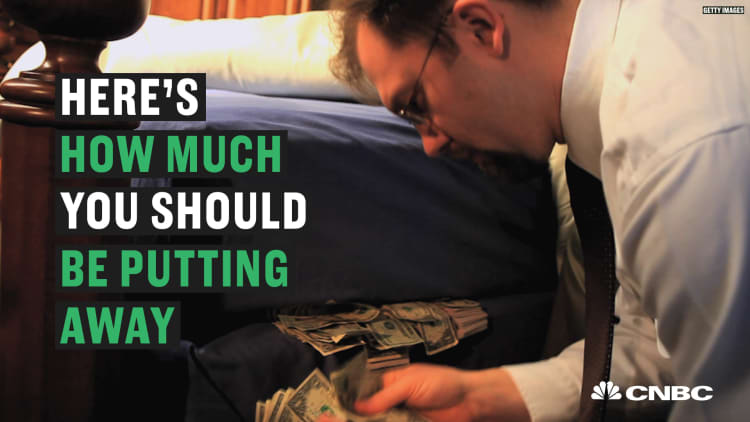Self-made millionaire David Bach says that budgeting is a waste of time. I agree. But that doesn't mean I don't want to be smart about money — it just means I go about saving differently.
When I first graduated from college and moved to New York City, I was overwhelmed by the possibilities. With so much to do and see and eat, it was difficult to restrain myself from blowing my entire paycheck on fun. But I was determined to stay on track, saving-wise.
I was already in the habit of automating my savings, so I tried to take my financial strategy one step further and create a budget that dictated how much I could spend each month across various categories, based on previous months' spending habits.
For months, I attempted to track and limit where I put my disposable income, but things got tedious and complicated fast. Was it okay to overspend on drinks if I saved on groceries? Did taking a cab home come out of my "transportation" category or my "fun" category? Should I subtract money from my total when I took it out of the ATM or when I actually spent it?
The nuances of sticking to what felt like a largely arbitrary budget became frustrating. And I'm not the only one who feels that way.
"What budgeting boils down to is depriving yourself for the sake of your future well-being," Bach writes in "The Automatic Millionaire." "This is certainly a responsible idea, but as a strategy, it goes against human nature."

Budgeting can feel like deprivation, Bach writes, the same way going on a diet can. While you know the end goal is your health, cutting out sugar or carbs only makes you want those things more. And, much of the time, diets end with people giving in to their cravings and finding themselves back at square one, feeling bad about having "failed."
Telling yourself you're not allowed to spend any more money on clothes or eating out feels a whole lot like trying to give up bagels or ice cream. Just like people get sick of counting calories, they get sick of depriving themselves financially, too, Bach says.
So I gave up the budget and started monitoring my finances the opposite way: I calculated and subtracted my fixed costs first and then spent what was left. It felt backwards at first — but it worked. It wasn't until years later that I read David Bach's book and learned that my strategy had a name. It's called "paying yourself first."
To make sure that I'm not leaving myself too little to actually cover all my expenses, I roughly follow the "50-30-20 rule," which dictates that 50 percent of your income goes towards necessities, 30 percent towards discretionary spending and 20 percent towards saving. The most helpful choice I made to fit within these parameters was make sure and find an apartment where rent doesn't exceed 30 percent of my monthly income.
While the 50-30-20 rule is helpful, I don't follow it exactly. I do make sure I'm not putting more than 50 percent of my income toward necessities like rent, utilities and other bills, but I switch the other categories, so that I put 30 percent of my income into savings and aim to spend no more 20 percent on discretionary expenses.

Now, I treat things like saving, investing and contributing to retirement accounts as a fixed cost, much like my colleague Kathleen Elkins. I add these "expenses" to my list of fixed costs for the month to determine about how much I'll have left over.
Once I've figured out that number, which stays pretty much the same month-to-month for me, I'm free to spend it however I wish. The fluidity allows me to edit my priorities as I go, instead of fretting that I've overspent in a certain category.
I can splurge on a meal out and make up for it by taking advantage of free activities over the weekend. If I keep my grocery bill low, I can go see a movie or take a Lyft home after a night out. As long as I stay within my limit, it doesn't matter if I'm buying groceries, birthday presents or new clothes.
I no longer feel stressed or guilty about not coloring inside the lines of my arbitrary budgeting categories. By paying myself first, I'm forced to stay within my limits. But what I do inside that boundary is totally up to me — and that's a great feeling.
Like this story? Like CNBC Make It on Facebook
Don't miss:



